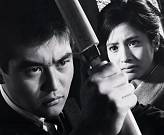|
|
||||
|
|
by Donald Levit  Before settling into five-co-features from an animated television spaceship series, Toshio Masuda directed the first of a successful six-part burai series, which was Gangster VIP/Burai yori daikanbu. Fifth of eight once-monthly low-budgeters not previously screened in this country, at Japan Society’s No Borders, No Limits: 1960s Nikkatsu Action Cinema of akushon, it fuses the stylized capital city of a nation desirous of retaining what was good in a defeated past, including swordplay movies, with post-Occupation influences of jazzy noir and Italian Westerns set in The available color print faded and thin digital green subtitles difficult to read, the result has a washed white and sepia tone fitting for a grim lesson that crime may be the only way out from the wrong side of the tracks -- urban rails figure throughout -- but that, once in the underworld, there is no easy way out. Such is standard stuff, though here based on at least one life managing to buck the odds, that of former yakuza Goro Fujita, whose memoirs served as a point of departure even if “all events and characters are fiction.” Most of these characters come across as thin stereotypes, from bumbling comic goons to the old-style college coed women, even runaways and whores, who simper, suffer and are true to their reckless menfolk. But while situations and people seem hokey, Tetsuya Watari works hard to gain sympathy and respect for his decent guy Goro the Killer Fujikawa, onscreen for all but seconds of the ninety-three minutes. As lukewarm social commentary -- this criminal is made not born -- a bluish monochrome introduces the hero as a luckless poor child who loses mother, then father, then sister Momoko, as a result of the indifference of wealthy medical men and neighbors, “Bad men! I hope you die!” Taking to the streets and petty filching, he winds up at the Tokyo Boys’ Reformatory and escapes. In a glitzy bar, a Ueno gang hatchet man is summoned but too late to save a higher-up. The enforcer for the rival Mizuhara bunch, grown-up Goro confronts the newcomer, his childhood mentor Katsuhiko Sugiyama (Kyosuke Machida), and stabs the dapper gun-toting other, who is carried to a police ambulance aware that his adversary purposely did not strike his feared knife for a vital part. Both addressing their men as “darling,” the combatants’ girlfriends promise to wait faithfully. SPOILER ALERT Three years later, 1955, nonchalant Goro is released from prison and, in his habitual sartorial simplicity, routs five rival toughs menacing a pair of demure young ladies. He warns the women against the big bad city and would be off, but runaway Yukiko Hashimoto (Chieko Matsubara) loves him at once and tags along unwanted. After jail “Every girl looks good to me,” especially since Goro’s impatient lover has married “an ordinary salesperson,” although she later tries to rekindle the spark. He roams the district with a pair of comic lesser gangsters who offer their apartment and one of whom, Takeo Tsujikawa (Tamio Kawaji), is naïve, smitten with waitress Kimiko, and is the younger brother of a top member of Ueno. Gozo finds it impossible to stay out of trouble -- and love -- in this environment where Aniki designates as much cohorts in wrongdoing as blood relationship. Goro-less, the waning Mizuhara seek to strike a humiliating 40-60 bargain with their competitors, but there are swaggering confrontations and raids around every corner, including one muddy knife battle in which distraught Takeo feels he has killed his brother. Defying gruff discouragement, determined Yukiko moves in with Goro, demurely caring for house and hero even to the hospital where he recovers after cutting off his pinkie as ransom and being knifed for his pains. She melts when, to get rid of his old girlfriend, he introduces her as his wife and then agrees to leave with her for happiness. Tubercular mentor and rival Sugiyama shows up and with his wife Yumeko (Kayo Matsuo) convinces Goro to accompany them with his wife into peaceful retirement. In the tale’s desperate pessimism, those who live by the sword die by it: his girl’s love-words ringing in his ears, young Takeo is murdered before her eyes on a train platform; bilked of money, Sugiyama is slashed in his own home. Goro puts on a confident face, lies to the two wives already on the train, and sends them on ahead. Despite much awkwardness that has passed, Watari has built up dignity for his character, and after an improbable but exciting settling of scores, his final solo gesture is unique, from behind on a deserted nocturnal street. Gangster VIP is a notch above many other derivative genre pieces of its period, enough to draw warm applause from the nearly 260 who braved evening snow to make it to Lila Acheson Wallace Auditorium. (Released by Toho Company; not rated by MPAA.) |
||
|
© 2026 - ReelTalk Movie Reviews Website designed by Dot Pitch Studios, LLC |



